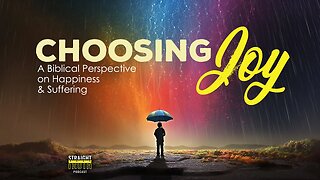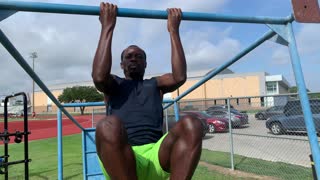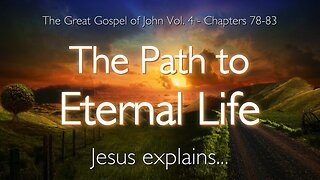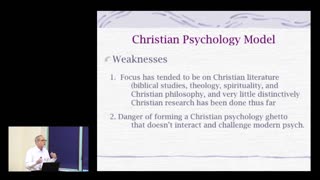End-of-Life Decisions: A Christian Perspective on End-of-Life Decisions
The Sovereignty of God: https://youtu.be/hBYImXogg6A
A Christian's View of the Body: https://youtu.be/neadVvR3EeI
Fearless Expectations: https://youtu.be/JuhIQiETJUQ
Hopeful Grief: https://youtu.be/uGyEd4FMwQs
Thinking Our Way Home: https://youtu.be/3P02G6kKkNY
Christ's Resurrection & The Believer: https://youtu.be/jgTY3x_o6fc
How should Christians handle end-of-life decisions? Are there principles that should guide Christians in making end-of-life decisions? Will the principles be the same for all end-of-life situations? How can we know what is best?
Making decisions for someone we love when they aren't able can be arduous. Making decisions for/about someone else's health and well-being is often clouded with emotions and can be intensely painful. So when someone finds that they need to make an end-of-life decision for a loved one, the weightiness of that decision can be more than any of us want to bear. But these things are inevitable, and without a living will or a durable power of attorney for health care that expresses our loved ones wishes, we need to make the best possible informed decision or decisions that we can. So how should Christians approach these kinds of decisions? Is it ever appropriate to withdraw medical treatment from someone so that they can pass away? Or, do we have a responsibility, knowing the sacredness of life, to try to preserve it at all costs? Join Dr. Josh Philpot and Dr. Richard Caldwell for this episode of the Straight Truth podcast as they seek to encourage us with biblical wisdom and guidance in the answers to this subject.
Dr. Caldwell wants us to first know that God is sovereign and to understand that there is nothing He is not sovereign over. Knowing God is sovereign over all things is a comforting doctrine. God’s Word tells us that all our days were written down before we lived even one of them. There is a day for our birth and a day for our death, and both of them were determined by God before we ever lived. As we think about this, it will help us to remember that life and death are never in our hands, nor the doctor’s hands. To live or to die is in the hands of God. We don’t have to feel guilty as if we are in control of our loved ones living and dying because we aren’t; God is. Until Jesus comes again, we all have a day to die. For the believer, it’s a portal into the presence of God, a day of great rejoicing. For the unbeliever, it’s a tragic day.
Secondly, Dr. Caldwell mentions we live in an era that God has placed us in, which most of humanity never experienced. Because of the advances made in medical technology, we sometimes face decisions that past generations wouldn’t have even faced. If we have a loved one on medical equipment that's sustaining their life, we can choose to have those unplugged. We don’t have to feel guilty if we make a choice to turn a person over to the natural processes.
A third thought Dr. Caldwell shares is that because of advancements in modern medicine, there are times that it may present the possibility for life to go on. So if there is hope for intervention that might bring recovery and extend our loved ones life, we don’t need to feel guilty about wanting to wait to remove those life-supporting systems. It’s not wrong for us to want to wait and see if there is a way that they might recover. We don’t have to feel guilty about this.
So while it is possible that our loved one might perish without the life-sustaining medical equipment and intervention, at the same time, it is possible that they might not. God may sustain them to full recovery, but He might not. We do not have to feel guilty about considering both options. We should listen to the doctors and get good medical advice, all while keeping the truths of God’s Word in our minds. God knows our hearts, and we can make these decisions either way and rest in His good and perfect care.
Keeping these three things in mind will help us make the best wisdom-informed decisions that we are able. Dr. Caldwell says he believes that this makes these decisions less intense. He also says that it is good if people can make their intentions and wishes known in advance before loved ones have to face these decisions. Those ways of making these things known are helpful because, then, we don’t have to feel guilty about honoring our loved one's wishes. He wishes there was a hard and fast rule for each situation, but there isn't. So we need the Spirit of God, and we also need good sound judgment.
All of our days are in the hands of our God. We cannot add a single hour to our lives or the lives of our loved ones. Our responsibility is to provide the best loving care we can, make wise, informed decisions as we go along, and trust God, our Creator, and Sustainer, for the time He has determined when a life shall end. Following are sermons to listen to that will help us as we think about life and death.
-
 11:15
11:15
Straight Truth Podcast
1 year agoChoosing Joy – A Biblical Perspective on Happiness and Suffering
44 -
 12:59
12:59
Bible For Overcomers
1 year agoGod, the Bible, and you taking decisions in your life
17 -
 58:54
58:54
pastorvladsavchuk
9 months agoEnd Time Church Prophecy: Are We Living It?
129 -
 0:36
0:36
Inspirational and motivation for today
2 years agoInstructions for eternal life
52 -
 0:40
0:40
HowToBeHealedTV with Christian Diggs
8 months agoHealing Scriptures Concepts 35 📖 Romans 4:19-21 NKJV ✝️ Consider GOD's Promise Not Bad Circumstances
137 -
 7:28
7:28
Divinity143
1 year agoPro Choice Christian - Hear Me Out | Divinity said | Choose Life (Eternal)
161 -
 39:30
39:30
Jesus' Revelations thru Jakob Lorber English
1 year agoThe Path to eternal Life... Jesus explains ❤️ The Great Gospel of John revealed thru Jakob Lorber
4941 -
 5:04
5:04
Intensive Care Hotline
11 months agoAnother Real vs Perceived End of Life Situation in ICU and Another Life Saved!
10 -
 45:20
45:20
Todd Coconato Show
11 months agoFeeling Left Out? God Has Not Forgotten You: A Biblical Christian Perspective
1.09K1 -
 35:02
35:02
The Truth Is Hated To Those Who Hate The Truth!
5 months agoChristianity and Psychology – Eric Johnson
116